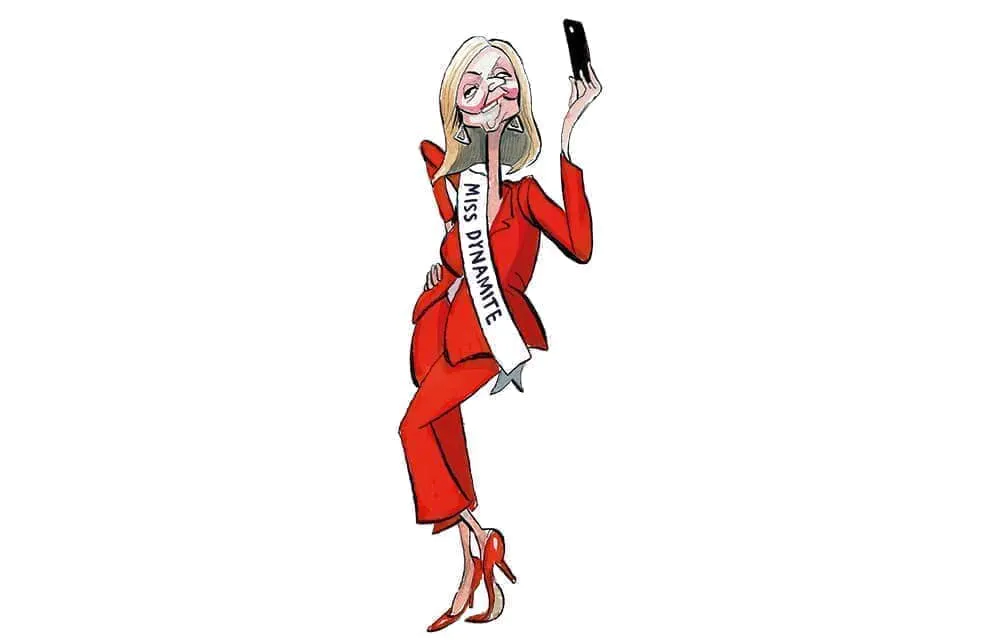Here she is, then. Liz Truss is Britain’s third woman prime minister and she’s already suffering from the not-so-soft bigotry of low expectations.
Almost everyone is looking at this woman the Tory membership has chosen to lead the country and feeling glum. She is someone widely seen in political and media circles as a lightweight and an embarrassment. The overly drawn-out and stale leadership battle between her and Rishi Sunak hasn’t helped either. Can Liz Truss ever hope to win a general election?
But most new leaders enjoy a popularity bounce upon entering high office. Remember May mania? She experienced a 5 percent surge in the polls in her first month in No. 10. Well, get ready for Liz mania.
It’s undeniable that what wonks like to call “the political headwinds” are blowing strongly against the new PM. The pound is at a thirty-seven-year low, and the energy crisis seems certain to bankrupt many people and small businesses in the coming months. The markets don’t seem particularly excited about her “growth agenda.” Since Brexit, the international opinion-forming classes dismiss Britain as a political and economic basket case. And there is no denying that the political system and the Conservative leadership have struggled to cope with the weight of the various crises of the last six years.
But Truss is in fact well-positioned to turn the burden of very low expectations into a boon. When countries are in the grip of a “doom spiral,” as Britain is, a new leader can bring hope in unexpected ways. Truss is a different type of politician to May or Boris Johnson — she’s more of an authentic free-market liberal. She will cut taxes, which is popular with the public. If she does freeze the energy price cap and provide meaningful relief for businesses, she will have started by addressing the public’s most pressing concern.
People desperately want grounds for optimism and Truss’s growth agenda at least aims to do that. Moreover, the widespread and strangely intense contempt for Truss is a great asset for her politically, as anyone who understands the British can grasp.
As Gareth Roberts noted here, Truss’s woodenness is her strength. In the UK, we tend to form ironic attachments to public figures we feel are publicly awkward or even a bit crap. She isn’t polished or slick. She is awkward in a way that most people are.
She also inspires a particularly unpleasant form of clever-clever loathing that will make fair-minded people warm to her. She tends to make her enemies so angry they overreach and sound unhinged. It’s here perhaps that comparisons with Thatcher are apt.
The comedian Joe Lycett may have won lots of attention and some more fans for his mockery of Truss on television on Sunday. But most people will have seen his performance for what it was: a smug twerp in a stupid yellow shirt thinking he was better than everyone.
Jonathan Pie, the character created by the comic-turned-rantypants Tom Walker, this weekend tweeted this:
Your new Prime Minister ladies and gentleman…is a cunt of the higher order. pic.twitter.com/B3TPruRUi4
— Jonathan Pie (@JonathanPieNews) September 4, 2022
That got more than 15,000 likes, inevitably. But it’s really just a nasty and misogynistic remark. Most people find that kind of talk repulsive, no matter if it is pitched on the moral high ground.
British comedians thrive off enraging the plebeian Daily Mail right. It’s good for engagement. Walker, who used to work for Russia Today, just did a performative op-ed for the New York Times — a newspaper which, since Brexit, has become weirdly obsessed with talking about how screwed we are. In the video, Pie says that “Boris … was born a heartless bastard. Whereas Liz Truss has made the choice to be one.” Ho ho ho. Pie is in his own way very English: national self-hatred is our great skill. It’s the only way we can square our sense of superiority with our position in the world.
But the snide bullying of Truss doesn’t just alienate tabloid-reading conservatives. It’s off-putting to everyone who isn’t consumed by media politics.
We’ll see a lot more Jonathan Pie-ish unpleasantness aimed at Truss in the coming days — especially if she pushes ahead with a low-tax agenda and tries to reform the National Health Service. But the fierce hatred she inspires will make people like her more, not less. In fact, as we saw with Boris Johnson, people will grow fond of Truss’s ability to bring out the rage of her opponents.
None of this is to say Truss will prove to be a successful prime minister. Theresa May certainly wasn’t. Or that “Liz mania” will be anything but a little blip on the Tories’ march towards the political wilderness. But in the next few weeks she is well-poised to rise above the general gloom surrounding her elevation.
This article was originally published on The Spectator’s UK website.


















